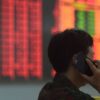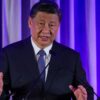A Rolls Royce using generation the doorway of the Jaeger-LeCoultre boutique on Rue du Rhône on August 2, 2025 in Geneva, Switzerland.
Robert Hradil | Getty Photographs Information | Getty Photographs
Trade leaders are scrambling to get their head round a unutilized future of tariff complexity.
The bemused temper amongst Ecu executives on Thursday got here as U.S. President Donald Trump desired to reshape the worldwide buying and selling device in The usa’s partiality.
The Trump management slapped upper tariff charges of between 10% to 50% on dozens of buying and selling companions simply upcoming middle of the night ET, following months of delays and extensions.
As of Thursday, maximum imports into the U.S. will now face a baseline tariff charge of 10%, even supposing the whole tariff efficient tariff charge is estimated to have climbed to greater than 17%, in step with the Yale Budget Lab think tank. That represents the perfect degree of price lists since 1935, throughout the Admirable Melancholy.
Zurich Insurance coverage CEO Mario Greco mentioned on Thursday that he used to be “confused” through Trump’s tariff bulletins, in step with Reuters. He reportedly added on a press name that the U.S. tariff blitz seemed to “part of the game, to create chaos.”
The Swiss insurer, which doesn’t be expecting a unutilized future of world industry contention to affect its trade, mentioned it used to be smartly situated over the approaching months.
“Look, what is important for business is to have clarity and to have decisions. Business adapts and adjusts itself and we are prepared to any kind of conditions in the market, as we have done in the past, but clarity is very important,” Greco informed CNBC’s “Squawk Box Europe.”
Oliver Bate, CEO of German insurance coverage gigantic Allianz, shared Greco’s evaluate of the tariff status.
“If you are not confused, I don’t know what confuses a human being. But we have to see through the confusion,” Bate informed CNBC.
“So, I can talk about being confused but our customers expect us to provide protection to them. Second, it doesn’t affect us very much directly. The thing that does affect us on the accounting level is the volatility around foreign exchange and the potential volatility in financial markets,” he added.
‘Very difficult’
Primary buying and selling companions, such because the U.Ok., Japan and South Korea, have tie offer to get decrease price lists than the ones introduced through Trump in early April. The Ecu Union has additionally struck a framework oath to decrease price lists on maximum EU items to fifteen%.
Alternative international locations had been crash tougher through Trump’s industry conflict. The U.S. has imposed levies of fifty% on items from Brazil, 39% on Switzerland, 35% on Canada and 25% on Bharat.
Carsten Knobel, CEO of German shopper items and adhesives maker Henkel, described the tide marketplace climate as “very challenging and uncertain.”
“This is reflected due to the geopolitical tensions but also the trade and tariff conflicts — and also the military escalations we see in a lot of countries,” Knobel informed CNBC on Thursday.
Worries a few shortage of industry simple task used to be a regular tale throughout income season.
“One of the things that for us, if I look at the medium to long term outlook, is certainly a concern is the lack of certainty,” Vincent Clerc, CEO of Danish transport gigantic Maersk, informed CNBC.
“One thing is having to deal with baseline tariffs or tariff regime that you know you can count on when you’re making investment decisions or when you’re making strategic decisions,” Clerc mentioned.
“What we feel from a lot of our customers is that this uncertainty is causing a delay on investments and could have an impact on global growth and global demand as people are waiting to see what is the right decision.”
Maersk, broadly thought to be a barometer for world industry, mentioned a sustained duration during which companies can become familiar with the introduced industry offer would support consumers lead a unutilized section of globalization.
Siemens CEO Roland Busch, in the meantime, welcomed the passing of the untouched tariff closing date, week making cloudless the advance used to be more likely to have a restricted affect at the trade.
“The most important point was, of course, to have certainty now, which is good. We would have wished for lower tariffs. We are clear for global trade but the impact on our Siemens business for this current fiscal year is minor,” Busch mentioned.

















